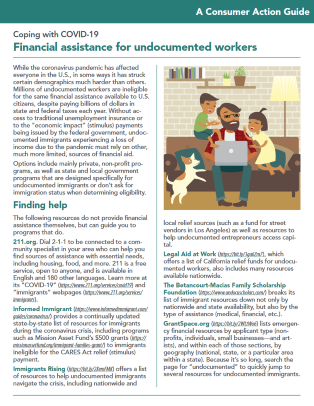Financial assistance for undocumented workers
Coping with COVID-19
Millions of undocumented workers are ineligible for the federal economic aid available to U.S. citizens during the COVID-19 pandemic. This publication provides tips and resources for finding state, local and private financial assistance programs that are designed specifically for undocumented immigrants or don’t ask for immigration status when determining eligibility.

Publication Series
- This publication is part of the COVID-19 Educational Resources training module.
Download File
PDF files may contain outdated links.
Financial assistance for undocumented workers
File Name: Undocumented_COVID_2020_EN_v1.3.pdf
File Size: 0.1MB
Languages Available
Table of Contents
While the coronavirus pandemic has affected everyone in the U.S., in some ways it has struck certain demographics much harder than others. Millions of undocumented workers are ineligible for the same financial assistance available to U.S. citizens, despite paying billions of dollars in state and federal taxes each year. Without access to traditional unemployment insurance or to the “economic impact” (stimulus) payments being issued by the federal government, undocumented immigrants experiencing a loss of income due to the pandemic must rely on other, much more limited, sources of financial aid.
Options include mainly private, non-profit programs, as well as state and local government programs that are designed specifically for undocumented immigrants or don’t ask for immigration status when determining eligibility.
Finding help
The following resources do not provide financial assistance themselves, but can guide you to programs that do.
211.org. Dial 2-1-1 to be connected to a community specialist in your area who can help you find sources of assistance with essential needs, including housing, food, and more. 211 is a free service, open to anyone, and is available in English and 180 other languages. Learn more at its “COVID-19” and “immigrants” webpages.
Informed Immigrant provides a continually updated state-by-state list of resources for immigrants during the coronavirus crisis, including programs such as Mission Asset Fund’s $500 grants to immigrants ineligible for the CARES Act relief (stimulus) payment.
Immigrants Rising offers a list of resources to help undocumented immigrants navigate the crisis, including nationwide and local relief sources (such as a fund for street vendors in Los Angeles) as well as resources to help undocumented entrepreneurs access capital.
Legal Aid at Work, which offers a list of California relief funds for undocumented workers, also includes many resources available nationwide.
The Betancourt-Macias Family Scholarship Foundation breaks its list of immigrant resources down not only by nationwide and state availability, but also by the type of assistance (medical, financial, etc.).
GrantSpace.org lists emergency financial resources by applicant type (non-profits, individuals, small businesses—and artists), and within each of those sections, by geography (national, state, or a particular area within a state). Because it’s so long, search the page for “undocumented” to quickly jump to several resources for undocumented immigrants.
The Congressional Hispanic Caucus offers an extensive Spanish language and immigrant community COVID-19 resource list.
My Undocumented Life lists a variety of resources along with recent news about developments regarding financial assistance programs for undocumented immigrants around the country.
State, county and local assistance programs
Some states, as well as county and local governments, are trying to fill the void left by federal relief efforts that exclude undocumented workers by creating their own financial assistance programs for immigrants.
For example, California was the first state to offer financial assistance to undocumented immigrants during the pandemic, with its creation of a disaster relief fund that provides a one-time payment of $500 to eligible undocumented immigrants, whether they have lost a job or not (up to $1,000 per household). The funds became accessible in mid-May 2020 through selected community-based non-profits. Learn more at COVID19.CA.GOV, and in the COVID-19 Guidance for Immigrant Californians.
With the exception of a few programs, like California’s, most sources of state assistance are privately funded community efforts, such as the New York City COVID-19 Immigrant Emergency Relief Fund, which, depending on funding, provides one-time payments of between $400 and $1,000 to undocumented workers and their families who lost jobs or are experiencing financial distress as a result of the pandemic. And Los Angeles implemented the privately funded “Angeleno Card” program, which provides up to $1,500 via a no-fee debit card to low-income Los Angeles households experiencing job or income loss because of COVID-19, regardless of immigration status.
To find available assistance (public and private), browse the resource lists mentioned above for programs offered where you live. None include information for all 50 states—only 20-30 each—but because new relief programs are being created, and some programs reopen as additional funds are raised, you’ll want to check back frequently for updates. Also do an online search for your state, county and city/town name plus keywords “covid-19 financial assistance for undocumented immigrants” (or similar).
Visit the Immigrant Legal Resource Center website to learn how receiving public benefits can impact your future immigration proceedings, and how “public charge” rules are being modified with respect to the COVID-19 crisis.
Published / Reviewed Date
Published: June 04, 2020
Download File
Financial assistance for undocumented workers
File Name: Undocumented_COVID_2020_EN_v1.3.pdf
File Size: 0.1MB
Sponsors

Notes
This guide was created as part of Consumer Action’s COVID-19 Educational Project.
Filed Under
COVID-19 Pandemic ♦ Discrimination ♦ Money Management ♦
Copyright
© 2020 –2024 Consumer Action. Rights Reserved.



